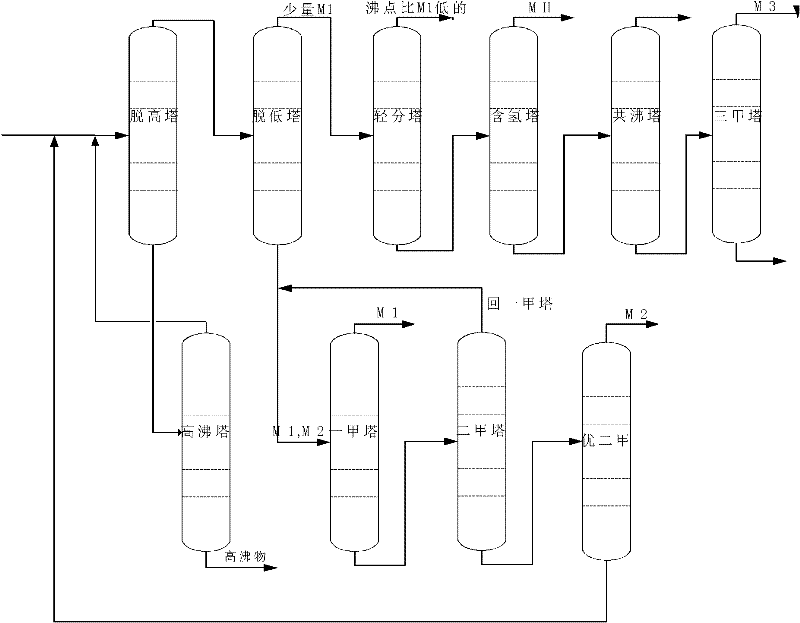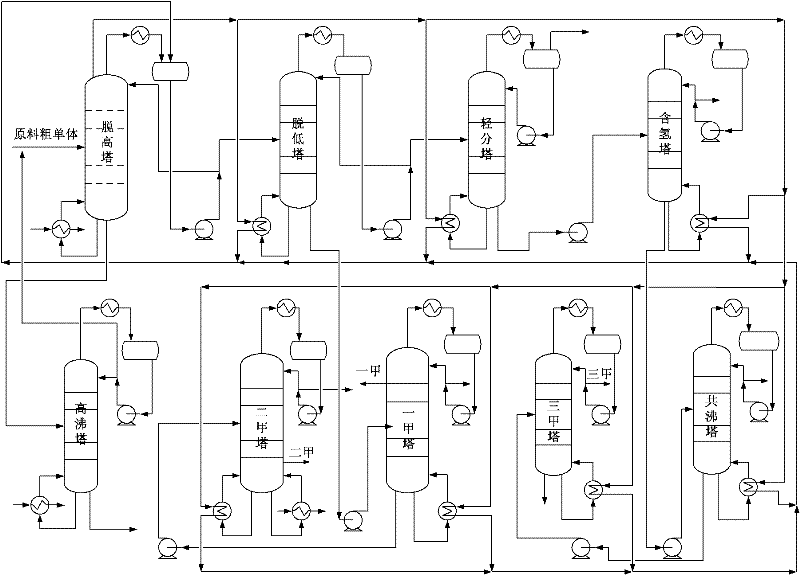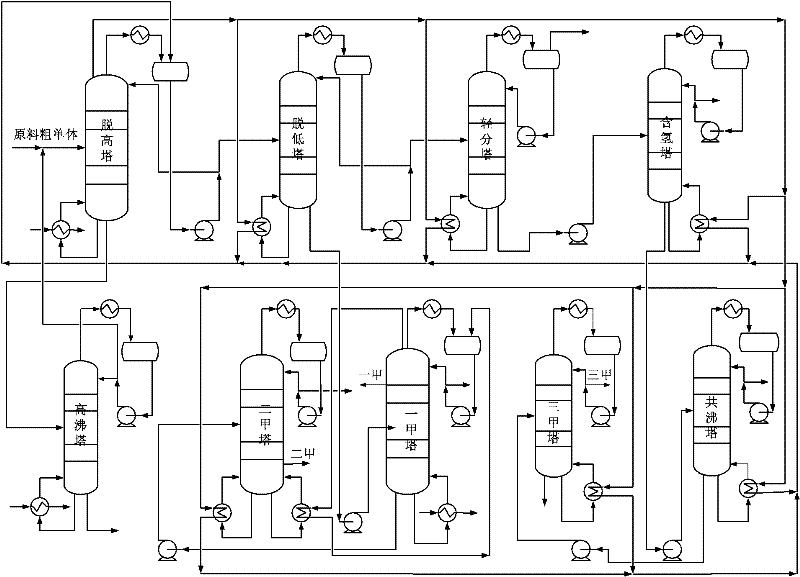Energy-saving water-saving organic silicon monomer rectifying method
An organosilicon and water-saving technology, which is applied in organic chemistry, silicon organic compounds, chemical instruments and methods, etc., can solve the problems of large loss of surplus monomer and A, and achieve reduced evaporation loss, strong operation controllability, The effect of flexibility
- Summary
- Abstract
- Description
- Claims
- Application Information
AI Technical Summary
Problems solved by technology
Method used
Image
Examples
Embodiment 1
[0022] The top material vapor of the de-higher tower first enters the distribution main pipe, and then passes through the distribution main pipe to the towers of the de-lowering tower, the light fractionation tower, the hydrogen-containing tower, the azeotropic tower, the three first towers, the first first tower and the second first tower respectively. The bottom reboiler supplies heat, and after the heat supply, the steam at the top of the de-elevation tower is condensed into a liquid, which is cooled by an air cooler to the reflux temperature and enters the top reflux tank of the de-elevation tower. The bottom of the dimethyl tower is connected to a first Two reboilers, the second reboiler adopts water vapor heat exchange, the average operating pressure of the whole tower of the described height removal tower is 300KPa, the temperature at the bottom of the tower is controlled at 135°C, and the temperature at the top of the tower is controlled at 120°C; The average operating ...
Embodiment 2
[0025] The top material vapor of the de-higher tower first enters the distribution main pipe, and then passes through the distribution main pipe to the towers of the de-lowering tower, the light fractionation tower, the hydrogen-containing tower, the azeotropic tower, the three first towers, the first first tower and the second first tower respectively. The bottom reboiler supplies heat, and after the heat supply, the steam at the top of the de-elevation tower is condensed into a liquid, which is cooled by an air cooler to the reflux temperature and enters the top reflux tank of the de-elevation tower. The bottom of the dimethyl tower is connected to a first Two reboilers, the second reboiler adopts water vapor heat exchange, the average operating pressure of the whole tower of the described height removal tower is 500KPa, the temperature at the bottom of the tower is controlled at 125°C, and the temperature at the top of the tower is controlled at 130°C; The average operating ...
Embodiment 3
[0028]The overhead material vapor of the de-higher tower first enters the distribution main pipe, and then passes through the distribution main pipe respectively to the bottom reboiler of the de-lowering tower, the light separation tower, the hydrogen-containing tower, the azeotropic tower, the three-methyl tower and the second-methyl tower. After heating, the vapor of the overhead material in the de-elevation tower is condensed into a liquid, cooled by an air cooler to the reflux temperature, and enters the top reflux tank of the de-elevation tower. The bottom of the dimethyl tower is connected with a second reboiler , the steam of the tower top material of the first tower supplies heat to the second reboiler of the second tower, and jointly maintains the operation of the second tower together with the first reboiler that is heated by the tower top steam of the de-higher tower. The top material steam of tower A enters the top reflux tank of tower A after being heated, and the ...
PUM
 Login to View More
Login to View More Abstract
Description
Claims
Application Information
 Login to View More
Login to View More - R&D
- Intellectual Property
- Life Sciences
- Materials
- Tech Scout
- Unparalleled Data Quality
- Higher Quality Content
- 60% Fewer Hallucinations
Browse by: Latest US Patents, China's latest patents, Technical Efficacy Thesaurus, Application Domain, Technology Topic, Popular Technical Reports.
© 2025 PatSnap. All rights reserved.Legal|Privacy policy|Modern Slavery Act Transparency Statement|Sitemap|About US| Contact US: help@patsnap.com



